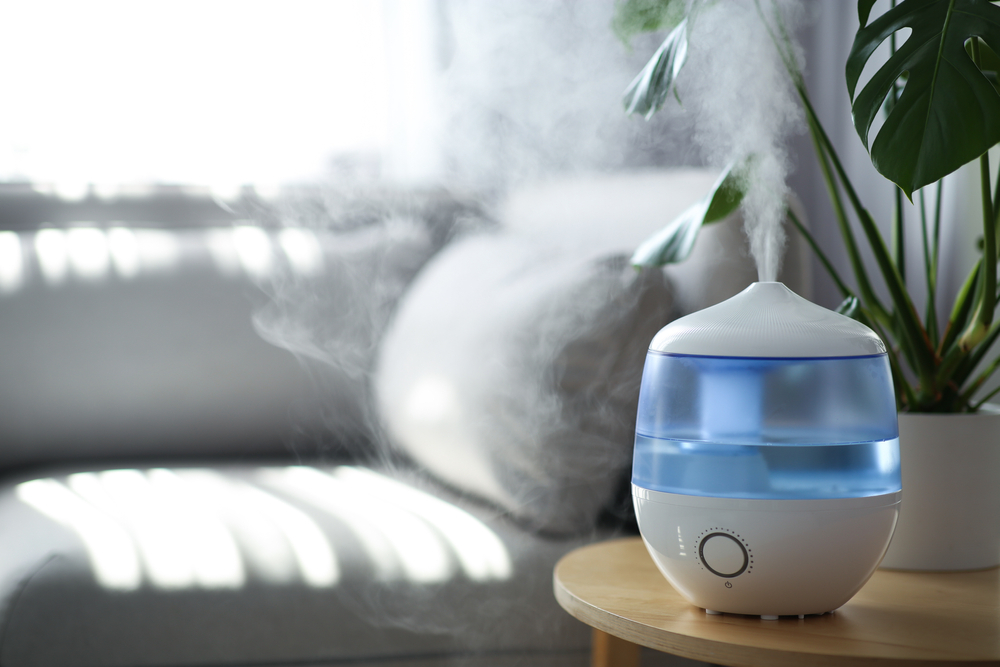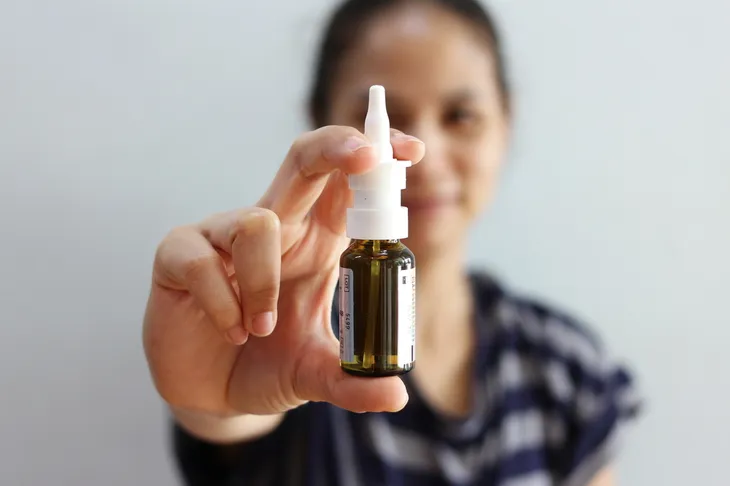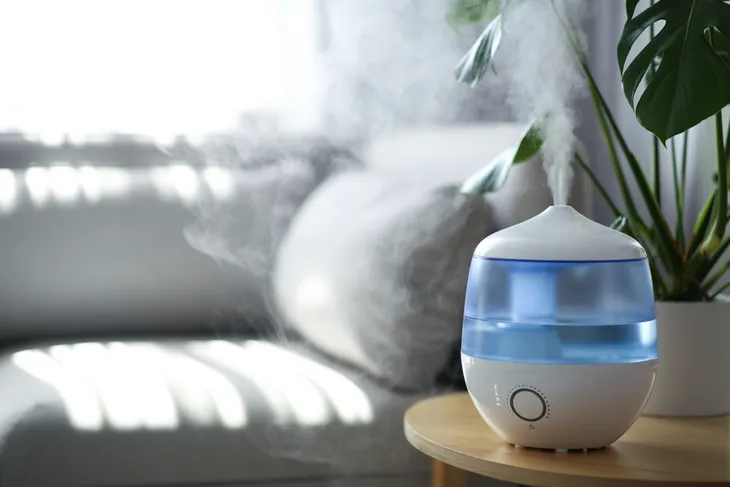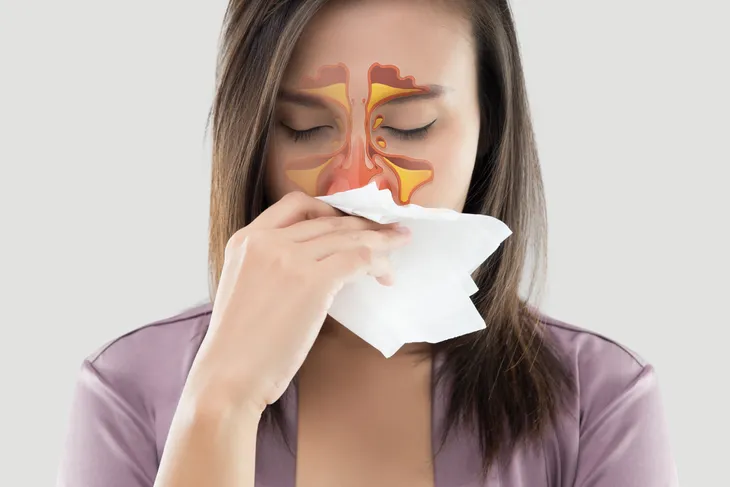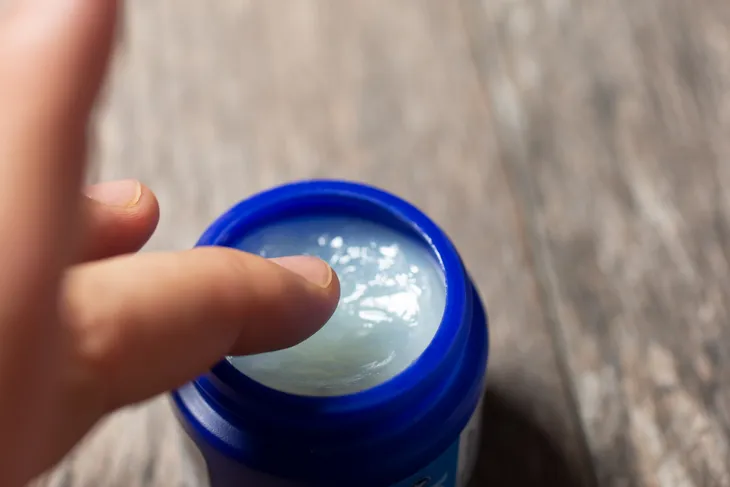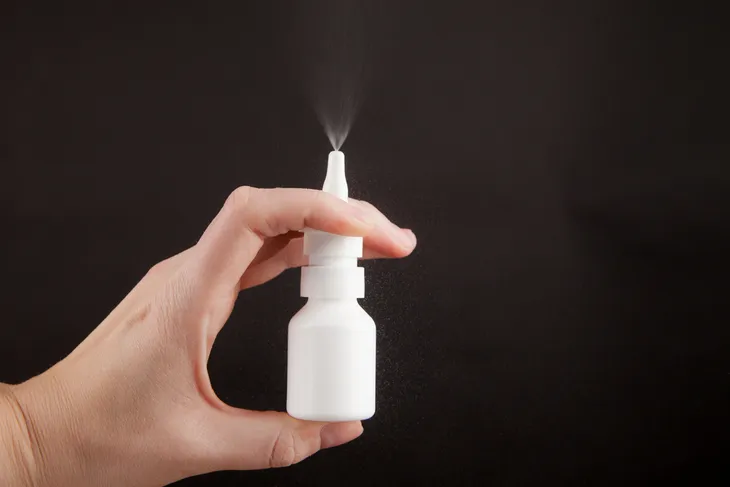- Moistening your airways using a saline solution or dehumidifier can help loosen thick mucus and relieve sinus congestion.
- Over-the-counter antihistamines or steroid nasal sprays can provide relief if you have allergy-related sinus issues.
- Certain essential oils, such as eucalyptus and menthol, may ease the uncomfortable sensation of being “stuffed up.”
- Consider consulting your doctor if at-home remedies for sinus congestion don’t work.
Sinus congestion can make you feel miserable, especially if you struggle to breathe through your nose or develop a sinus headache. There are various potential causes of stuffy sinuses, such as the common cold or seasonal allergies.
If your sinuses feel constantly congested, it’s worth consulting your doctor in case your stuffiness is a sign of an underlying health condition. However, there are also plenty of simple, effective ways to treat congested sinuses at home, including these 12!
1. Saline Irrigation
Saline irrigation involves pouring saltwater (saline) into your nostril and allowing it to drip out of the other side of your nose. Various studies show that this straightforward treatment can help rinse away excess mucus to relieve the stuffiness associated with sinus congestion. Furthermore, it can also remove dust and other allergens that could otherwise make the congestion worse.
The easiest way to rinse your sinuses is to use a pre-mixed container from a pharmacy. Alternatively, you can add up to half a teaspoon of non-iodized salt to 2-cups of warm water and pour the solution into your nostril using a neti pot or irrigation bulb. Holding your head downward over the sink can encourage the saltwater to flow back out of your nose.
2. Saline Nasal Spray
If you don’t like the sensation of nasal irrigation, a saline nasal spray could be an effective alternative for treating sinus congestion at home. Although research shows that irrigation generally provides more substantial symptom relief, hypertonic saline sprays can moisturize irritated tissues to reduce congestion. Evidence indicates that nasal sprays can also loosen mucus, making it easier to clear by blowing your nose.
You can purchase saline nasal sprays over the counter at pharmacies, drug stores, and online. This treatment could also be a suitable option for children suffering from blocked noses or stuffy sinuses.
3. Stay Hydrated
Drinking enough water is essential for maintaining overall good health and helping you recover from colds and other illnesses that commonly cause sinus congestion. However, staying well-hydrated could also offer additional benefits when dealing with stuffy sinuses.
Dehydration can make you more susceptible to illness and may cause or worsen nasal congestion. Furthermore, it can dry out the mucus inside your sinuses, making it thicker and more difficult to remove. Proper hydration helps thin the mucus to expel it when you blow your nose. How much water you should drink varies from person to person, but Harvard Health recommends aiming for between 4- and 6-cups per day.
4. Use a Humidifier
Breathing dry air can cause various health problems, including dry, irritated sinuses. Humidifiers add moisture to the air, which may help ease sinus congestion and prevent thick, sticky mucus from accumulating. Ideally, you should aim to keep your home’s humidity between 30- and 50-percent if you have sinus issues.
There are various types of humidifiers, and it’s safest to use a cold water model to prevent accidental scalding if you have young children or pets. It’s essential to keep your humidifier clean, as dirty units can disperse allergens and potentially worsen the symptoms of asthma and allergies.
5. Over-The-Counter Decongestants
Decongestant nasal sprays containing oxymetazoline can provide fast relief from stuffy sinuses. They work by constricting the blood vessels inside your nose and sinuses, reducing swelling to open the airways, and relieving congestion. You can buy over-the-counter nasal decongestants or ask your doctor for a prescription.
Unfortunately, using this type of decongestant long-term can cause a phenomenon known as rebound congestion. Your congestion may worsen or return when you stop using the medication. Therefore, it isn’t suitable for prolonged use if you have chronic sinusitis, although it could be helpful if you have sinus congestion caused by a short-term illness.
 Shutterstock/UncleFedor
Shutterstock/UncleFedor6. Elevate Your Head When Sleeping
Sinus congestion can be particularly hard to cope with if your symptoms stop you from getting a good night’s sleep. Sleeping with your head propped up above heart level can prevent mucus from accumulating inside your nose and sinuses and causing stuffiness that could interrupt your slumber.
You don’t need any special equipment to benefit from this at-home remedy — simply adding an extra pillow or two is enough to achieve relief for many people. However, it could be worth investing in a wedge pillow if your sinus congestion regularly disrupts your sleeping patterns. These pillows create an incline, keeping your head at an ideal elevation throughout the night.
7. Allergy Medication
Allergies are a common cause of congested sinuses, and it’s easy to mistake the symptoms of allergies for those of sinusitis. If you’re experiencing hay fever or another allergy that causes nasal congestion, treating your condition can help improve your sinus problems.
You can purchase over-the-counter allergy medication, and it could be worth considering a medication that contains both an antihistamine and a decongestant if your symptoms are acute. If your sinus congestion doesn’t improve, your doctor may prescribe a stronger antihistamine to control your allergies and sinus congestion.
8. Try a Microcurrent Wave Device
If you’re experiencing pain due to congested sinuses, a microcurrent wave device could be worth trying. These devices are a relatively new invention, and proponents claim that they work by applying low-level electrical stimulation to the facial nerves to reduce sinus pain. You can apply the device to painful areas for a few minutes per session, and many companies claim that their machines can provide relief for several hours.
The jury’s out on whether microcurrent devices are effective. However, some promising, small-scale evidence suggests that they may help provide rapid, safe pain relief. More research is required to draw firm conclusions, but it could be worth a try if you want a drug-free solution to sinus discomfort.
9. Menthol Inhalation
Menthol (an organic compound found in peppermint) is one of the best-known home remedies for a stuffy nose, and it could help treat the uncomfortable sensation of sinus congestion. You can use menthol to treat stuffy sinuses by inhaling it, either by adding menthol crystals to hot water and breathing in the steam or rubbing a menthol balm on your chest.
Interestingly, research shows that menthol doesn’t reduce congestion in the airways. However, it acts as a cold receptor agonist, which means that it stimulates cold receptors in your nose and sinuses to create a cooling effect. Therefore, inhaling menthol can reduce the discomfort of not being able to breathe properly without actually unclogging your sinuses.
10. Other Nasal Sprays
Nasal sprays containing corticosteroids may be a helpful at-home remedy for allergy-related sinus congestion. These sprays are available over the counter, but your doctor may prescribe a stronger version if your symptoms are severe or other options haven’t worked.
Corticosteroid sprays relieve swelling and reduce excessive mucus production in the nose and sinuses. They can also reduce the swelling and itchiness associated with allergies. These sprays work best when you use them every day, and it may take a couple of weeks before you see results. Therefore, it’s often best to start taking your steroid spray when pollen season starts if you have sinus congestion caused by seasonal allergies.
11. Eucalyptus Oil
Eucalyptus oil comes from the leaves of a native Australian tree, although you can find products containing eucalyptus in most drug stores and pharmacies. It comes in various forms, including inhalation products, balms, and lotions. Like menthol, eucalyptus oil can activate the cold receptors in your airways to reduce the sensation of stuffiness.
However, eucalyptus could be particularly helpful for people with sinus congestion caused by allergies. A Korean study discovered that inhaling eucalyptus over several weeks can significantly reduce the symptoms of allergic rhinitis (nasal mucus membrane irritation). Other research also shows that the compounds in eucalyptus oil have anti-inflammatory properties and may reduce mucus production.
12. Steam Inhalation
Although some studies have found that steam inhalation is ineffective for treating sinus congestion, many people find it helpful. You can inhale steam by filling a heat-proof bowl with hot water, leaning over it, and placing a towel over your head to contain the steam.
Breathing through your nose for around 10-minutes could help relieve pressure in your sinuses and loosen mucus. You could consider adding a few drops of eucalyptus or menthol oil to the hot water to make steam inhalation more effective.
 Shutterstock/New Africa
Shutterstock/New Africa